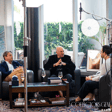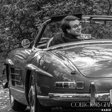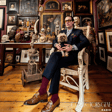Introduction to the Collector's Gene
00:00:00
Speaker
People collect because they want to be a part of something and they want to signal that. What's going on everybody and welcome to collector's gene radio. I'm your host Cameron Steiner and I'm joined by my co-host and brother Ryan. This is all about diving into the nuances of collecting and ultimately finding out whether or not our guests have what we like to call the collector's gene.
00:00:26
Speaker
That's right. And as always, please subscribe and leave a review for us. It truly helps. We hope you enjoy the pod. Let's go.
Todd Levin's Unique Collecting Style
00:00:40
Speaker
as an art curator, Todd Levin is kind of in that unique position where his attention to detail and the research that goes into what he does for a living really plays a role into his personal collecting. A collector of many things from art and watches to rare jazz records and architecture, Todd hasn't necessarily taken the typical approach, if you will, to
00:01:03
Speaker
collecting some of these things. For example, Todd has always appreciated watches, but after reconnecting with them once his dad passed away, Todd went right for the big boys. And I'm not talking about Patek, Rolex, Audemars Piguet, but I'm talking about George Daniels and Philippe Dufour. And that may not mean a lot to some of you, but for us watch nerds, that is big time.
00:01:27
Speaker
Yeah, I mean, how about his new but old Frank Lloyd Wright house that has no 90 degree angles. I mean, Todd does things with a purpose and doesn't make any rash decisions, which we absolutely love. It's a side of collecting you don't see often. He isn't hoarding or necessarily amassing, but artfully collecting with finesse. So take some notes on this one. Here we go. Todd Levin for Collectors Gene Radio.
Frank Lloyd Wright's Design Philosophy
00:01:58
Speaker
Well, Todd, we wanna thank you so much for joining us today and taking the time out of a kind of an absurd year to chat with Cameron and I about collecting a little bit. My pleasure.
00:02:12
Speaker
We would be remiss, I guess you could say, if we didn't start our conversation today by talking about where you're joining us from, which is the incredible Stuart Richardson, Frank Lloyd Wright home. Can you tell us a little bit more about this home and why it is special, other than the obvious?
00:02:32
Speaker
Wright built a number of homes in the United States. They started right around the same time as the famous Falling Water House in Biorun, Pennsylvania, that when most people think of Wright, that's one of the first buildings along with the Guggenheim that comes to mind. And
00:02:49
Speaker
These homes were built supposedly for modest people of modest means, as opposed to the Kaufman House, also known as Falling Water, which is on a rather grand scale, both technically and in terms of its size.
00:03:08
Speaker
And this house, Stuart Richardson House, is one of such earlier Usonian houses that Wright designed. There were four in New Jersey, and unfortunately, one of them over the past years had been near a rising river and had flooded a number of times. And so recently, it was called the Bachman Wilson House, had been picked up and transported brick by brick and baton by baton to the Crystal Bridges Museum of American Art, Alice Walton's Museum, where it now resides.
00:03:38
Speaker
safely and people can visit it.
Hexagonal Homes and Family Influence
00:03:41
Speaker
So there are three houses in New Jersey left, and this is an unusual house. Most of Wright's houses in the Usonians, because they were built again for modest people of modest means, are built on a very simple structural scale. This house, specifically the Stuart Richardson house, is unusual.
00:04:02
Speaker
and rather complex because rather than being built the way most houses are, whether by right or not, on a square or rectangular motive, this house is built on a hexagonal motive and it has no right angles anywhere in the house. The angles are all 60 or 120 degrees. I love that. We understand your mom too was a huge fan of Frank Lloyd Wright.
00:04:26
Speaker
Yeah, correct. My mother was an interior designer and also did architectural design as well. She's going to be 90 in a couple of days, so she's obviously retired now. And when I was a young man, she had to go to Chicago on a semi-annual basis regularly. That's where the large design shows back in the day used to be in a building called the Merchandise Mart. And while we went to Chicago,
00:04:54
Speaker
I would accompany her. We would take the tour of the right homes in the area. There used to be bus tours in the Oak Park area and whatnot. So that was something that was of interest to her and sort of passed along in the DNA to me. Yeah, wow. I mean, we grew up with a dad who worked down the hall in the house. We never really went on any work trips. I'm kind of jealous there.
00:05:22
Speaker
Was that a big component in terms of you acquiring the home, and then did she also get you into the world of art collecting?
Advising on Art and Personal Connections
00:05:30
Speaker
I would say no and yes. In terms of, I don't think that when one is a child, say five years old, 10 years old, whatever, and visiting something like Frank Lloyd Wright House, one thinks, oh, in half a century, I'll own one of these houses.
00:05:49
Speaker
It's also an issue that right houses to me when I was young, the reason they, you know, I don't know, they sort of stayed with me is because they always felt, I mean, I enjoyed them whenever I visited them. I thought they were amazing, but it was sort of as if aliens had studied earth from a distance and then plopped down these buildings that they sort of thought were houses to the best of their ability as far as they understood what they thought a house was.
00:06:16
Speaker
But they always seemed rather foreign, not because they didn't fit into the environment well or because they were out of context, but simply because they were so, for their time, further ahead in a design modality that I think it just seemed something to me that was more like a museum.
The Psychology Behind Collecting
00:06:42
Speaker
Stunning to me that people actually own these things even 50 years ago. So the fact that I own one now is, you know, it's still hard to believe it, to be quite honest. Last night, I was just walking around here in the evening and still thinking to myself that I really can't grasp the fact, honestly, that that this is something that I will own for, you know, whatever the period will be 10, 20, 30 years until my time is up, whatever.
00:07:12
Speaker
And then it will go on to somebody else, but I'll be a part of that kind of thing and sort of like what an amazing privilege that is. Absolutely. You know, we grew up in Arizona. That's where I'm based. And there is a huge Frank Lloyd Wright presence here. There are several Frank Lloyd Wright homes, which I've been fortunate enough to
00:07:33
Speaker
tour and attend events to, one of which is walking distance actually from where I live. There's even a whole street here named after Frank Lloyd Wright and it's pretty remarkable to go inside one of his works of art and kind of soak that in because it really is like nothing you've ever experienced before.
00:07:56
Speaker
Yeah, I think Wright spent time in Arizona later in his life on his doctor's orders. He had been spending most of his time at Taliesin, the compound, I guess I would describe it, that he built in Green, Wisconsin. And his doctor said that in the winters, it was getting tougher on him. So as most people know the story, he founded eventually Taliesin West in the Southwest. And so later in his life, there was a discovery or rediscovery
00:08:26
Speaker
uh rights work in that area and near the end of his life he built a number of houses there he was involved i don't think he was responsible per se but was involved in the design of the biltmore complex which is i believe in arizona he had heavy influence in the design and even the restaurants there there are restaurants named after him it's yeah yeah and that was just i think that just underwent a hundred million dollar
00:08:50
Speaker
facelift. So, but yeah, later in his life, and in fact, there's a building in Arizona, one of his houses, the likes house, I think is for sale.
Spiral Designs and Architectural Fascination
00:09:00
Speaker
Yep. As we're speaking, it's one of the last hemispherical homes. Yeah, there was a house that's right down the street from me. I can't remember the exact story. Maybe it was built for his son,
00:09:14
Speaker
or something like that. It's a massive property. I mean, I think it's one level. You drive up on a winding ramp basically up to the home and the home is basically a spiral. It's incredible. Yeah. Well, right with somebody who once he sort of got his teeth into a bone.
00:09:33
Speaker
really wouldn't let go of it. So he went through the spiral design multiple, multiple times in his life trying to get people to agree to allow him to do this sort of spiral design. There was going to be a car showroom that had a spiral design. There were going to be other buildings. I believe a temple was supposed to have a spiral design. And finally, you know, he really got it done, obviously, with the Guggenheim, except that spiral design is inverted.
00:10:01
Speaker
When you think about it, normally a spiral design would be wider at the bottom like a pyramid and spiral up to the top to a point. But the Guggenheim is wider at the top and it's smaller at the bottom. It gets wider as you go up, which is very, very odd. It's an inverted ziggurat or an inverted spiral design, which I think lends it an additional sort of air of grace where the house that you're talking about, I think, is the classic kind of wedding caked spiral wider moving to the top.
00:10:31
Speaker
Yeah. So Todd, for those who may not be aware, you own a company called Levin Art Group. And can you share with everybody a little bit about what you do for your clients and where your focus is?
00:10:45
Speaker
Yeah, fundamentally what any art advisory does or should do is you provide advice on the purchase and also the sale if necessary of artworks for either private individuals and or institutions.
Motivations for Art Collecting
00:11:03
Speaker
I happen to deal with both.
00:11:05
Speaker
So that's kind of nuts and bolts of what I do. And of course, certain advisors will specialize in certain areas in terms of either geographical areas or chronological areas, as do I. But that's fundamentally what an art advisory is.
00:11:22
Speaker
What is it about curating and collecting to you that you feel makes someone want to amass a collection of certain things? Because, you know, people can have obsessions, right? You can love movies, you can watch endless movies, you can watch them five times over, but going off the deep end and owning 500 Blu-rays, that's a whole nother ballgame. Well, there's been a long historical discussion about
00:11:50
Speaker
why people collect, what causes them to collect, why people fundamentally decide to surround themselves with the things that they do. And it's interesting, when you go back and you really read the writing on this, there's precious little sociologically driven, accurate writing on this subject, which is actually an interesting subject to me.
00:12:19
Speaker
The best thing I've ever read on what might cause people to collect or surround themselves with the things they do is a paper. It was really an essay. It wasn't even a book, but it's included in a book of essays by a writer named George Simmel and is back from 1895. It was reprinted in 1904 and it was actually in a
00:12:42
Speaker
The article was called Fashion. And he was really talking about the fashion industry and why people wear the kinds of clothes that they wear. Why wouldn't they wear other clothes? How does that operate within class, etc. But the fundamentals that are in that article from 1895 are really as trenchant and have never been better expounded upon than in that article. And it's weird that in over
00:13:12
Speaker
well over a century, nobody's really built up any sort of better or more thoughtful structure. And Simmel basically said that there's a push-pull between why people, in his case, where the fashions, the types of fashions that they select, but this could also be to why people collect and why do they collect the things they do.
00:13:36
Speaker
I'm paraphrasing here, but the idea is that there's this push-pull. On one hand, people collect the stuff they do, whatever that stuff is, because it signals to others that they are a part of a certain group or groups that they want to be seen as being a member of. Now, that could be financial groups, sociological groups, religious groups, racial groups, any kind of group. And usually it intersects. It's not a singularity.
00:14:06
Speaker
So one part is that people collect because they want to be a part of something and they want to signal that. However, the other reason that people in his article kind of wear the fashions that they do, and I would say you can again extrapolate that to why people collect the things they do, is because they want to be seen as an individual.
00:14:29
Speaker
with individual ideas and they want to be not a part of groups, but they want to be a part, one word, from groups. So it is this somewhat dipolar, I won't say bipolar, but dipolar
00:14:46
Speaker
uh almost like two magnets you know where you put the two north together and they sort of repel each other you know kind of thing and it's very accurate that people collect and decide to surround themselves with the things that they choose both in order to be a part two words of a group and signal that in some way but also be a part one word from any group and signal their individuality
00:15:13
Speaker
both at the same time. It's in that balance, in that interstitial space between the two, that's the reason that people collect fundamentally. What would you say going off of that? Would you say that that is one of the things that drives your personal clients the most or are there any similarities in each other's motives or are they different?
00:15:37
Speaker
Well, they're the same and they're different. Look, people collect for a multifarious, okay, group of reasons. I mean, it's the collection, let's say what I do to be more specific, right? Not in general. For a private individual of art, it's a very different kind of practice and employs a very different sort of methodology than
00:15:58
Speaker
just randomly going around and just buying stuff. I think when you're going to discuss the methodology for assembling a collection of art, either for a client, the way you're discussing it yourself, everyone is going to have a different dynamic.
00:16:13
Speaker
And I would say as an aside, as an advisor, there's nothing worse than walking into somebody's private collection, whether they collect art or watches or whatever, and seeing that it looks very much like a number of other collections and being able to surmise that one advisor has been responsible for all those collections.
00:16:31
Speaker
That's, you know,
Evolving Personal Reasons for Collecting
00:16:33
Speaker
if I'm not doing my job well, if you can walk into somebody's house and tell that I was the advisor, I always, when I, you know, teach the kids at Christie's and Sotheby's in their master courses, one of my adage to them is that you don't want to leave your fingerprints on the murder weapon as an advisor.
00:16:51
Speaker
So there's infinite reasons, there's hidden agendas, there's ulterior motives, and all sorts of bizarre cosmic rationale for collecting art, if that's what we're talking about. And I mean, I don't place a moral or ethical priority on one paradigm over any other. I mean, some possibilities I think could include, well, investment, you know, if we're being honest, right? There's peer pressure if you're within a certain social status and you're seeing other people collecting and then you're not like, you know,
00:17:21
Speaker
There's emotional stimulation just for yourself. There's intellectual stimulation. For some people, there's even spiritual stimulation. They really get that kind of fulfillment out of art. There's social status. There's patronage and philanthropy. Some people, you know, that's a component of why some people collect. They're building something larger that'll go on beyond them, whether they're donating it to a museum or building their own.
00:17:42
Speaker
And even something as simple as interior design, they want the space that they inhabit to look nice. So that's a ton of reasons right there. And there's as many really reasons there are as there are collectors. You know, there's no singularity there. And not only that, but all these reasons aren't fixed in time, which is to say, at a certain point, I might speak to somebody and investment is a really primary concern in terms of
00:18:09
Speaker
the artworks they're buying and they're less interested say in emotional or intellectual stimulation and at another time emotional and intellectual stimulation in a certain artist or body of work or period of work might be interesting and they're a little less worried about like the investment side and other times maybe they really want a certain thing because
00:18:28
Speaker
you know, they know that it'll signal to other people when they come over, it's more like a peer thing. And other times, like that doesn't matter at all. And those things are constantly shifting. It's very fluid within the same collector and the same collection. So as you go forward, you constantly have to kind of stop and do a really clear interior review of
00:18:54
Speaker
not only why you're collecting that thing, but why you're collecting that thing at that specific moment in time. So it's consistent and ongoing work, no matter what you collect, whether it's comic books or watches or art or, you know, Pez dispensers or Hot Wheels. None of that matters. The component you're talking about is why people collect those things, why they choose to surround themselves with those things.
00:19:18
Speaker
the larger modalities that we're discussing apply to all of that across all price ranges and across all medium. Yeah, with art in particular, sometimes in inventory of a piece isn't exactly an option, per se. So there's one moda Lisa. Does condition play as big of a factor in art specifically in terms of with pricing? Because nothing can truly compare this one particular work to another.
00:19:48
Speaker
Condition and rarity are interlocked. So if you're thinking about purchasing a work by ex-artist, okay, and ex-artist's output, let's say, let's assume the artist has passed away, it'll be easier that way. So, you know, if ex-artist's output in their entire life is, well, let's take Vermeer. I mean, there's some argument about this, but it's supposedly around 55 paintings, okay? And 54 of them are in museums.
00:20:17
Speaker
And there's one that might be available, okay? Condition really isn't as big a deal as when you're dealing with, say, you know, Picasso, who created, including paintings, works on paper, prints, and objects over the course of his life, over 150,000 objects. It doesn't mean that condition doesn't matter, it does. But when you're dealing with something that's exceptionally rare, you kind of have to accept it qua,
00:20:47
Speaker
the object, the thing as it is unto itself, because there isn't going to be anything to comp it against. If you want the thing, and it's one of the only ones left in the world in private hands that you can access, you're going to have to put up with a little bit of
00:21:01
Speaker
you know, potential condition issues as long as from a conservation point of view, they're not so structurally problematic or, you know, to the object that we're talking about, it's, you know, impending demise. Short of that, you know, you can put up with a lot of condition issues when something is exceptionally rare.
00:21:21
Speaker
that under normal circumstances, if something isn't quite as rare, you would not be willing to put up with and you would look at much more critically and make much more brutal decisions about whether it's correct to access that second thing when there are other potential options out there in the same price point.
00:21:41
Speaker
You know, condition is important, but again, you can't look at any single factor of why people collect or these issues of, you know, whether to collect this thing or that thing, sui generis in and of itself. It doesn't work that way.
00:21:58
Speaker
As a curator, yourself, and a collector, you get to see the best of what you do for your clients.
Ethics in Art Collection Management
00:22:08
Speaker
Do you ever struggle with selling something that you may come attached to? Are you talking about myself privately? Are you talking about when a client comes to me and says that they're interested in deaccessioning something?
00:22:20
Speaker
I guess it could go either way. Let's say you find something that is just an absolutely stunning piece and then vice versa, a client comes to you and says, hey, I need to offload this item. Is there a struggle between selling something that is objectively rare and beautiful and then obviously you have the business side of things?
00:22:41
Speaker
Well, for myself, I've never sold anything. 11 never walks away from equity. That's rule number one. So there's no selling. I buy it, and then it just goes into the pile, so to speak. I don't sell stuff. In terms of clients, what happens with clients, which is very interesting, and I think everybody
00:23:04
Speaker
speaking for my clients, monetizes some portion of their collection at one point or another. The two primary reasons why people tend to monetize are number one, when they began collecting, they really did have a natural affinity for terrific artists, but they weren't yet confident enough because it takes time and application
00:23:28
Speaker
to educate yourself to gain that confidence. They weren't confident enough to really buy the A level works by that A level artist. So they wound up buying B level and C level works. And then as time passes, they are far more understanding of that. And now they're willing to sell their B and C level works because they want to upgrade to the A level works. So that would be number one, which is very common.
00:23:57
Speaker
Another thing that happens is people buy A level works when they start, but they're by B or C level artists. They're not willing again to, usually because of price to leap up to the top tier artist in a particular group of artists or a particular generation or decade or period, whatever the case may be. And so at that point, they are willing to
00:24:20
Speaker
offload those A level works, but by lesser artists in order to access if they can, works by the key artists of that group generation style, whatever the case may be. Those are the two major reasons why
00:24:36
Speaker
I find my clients will monetize. It's usually to upgrade the collection. And then there are the other obvious things in the auction world. You know, when I worked at Sotheby's, we always spoke about the three D's, death, divorce and debt. You know, that always kind of triggers selling normally. So those are like some of the reasons why I've dealt with both institutions and private clients who have deaccession work at one time or another.
00:25:07
Speaker
To kinda like segue into you, Todd, the collector, we find it fascinating what drives a person in anything.
Family Influence on Collecting Passion
00:25:18
Speaker
And ironically, for collecting those two completely different things, our grandfather
00:25:24
Speaker
Is who kind of like we grew up idolizing we have an older brother to the same thing i mean he was just like the epitome of cool for us in a variety of different ways and you know he got me into collecting sports memorabilia and i even got more into it after he passed because i feel like everything that i am master my collection now.
00:25:45
Speaker
I have like this reaction of not only how much i love it but how much he would have loved this piece or whatever and with cameron who is a huge watch collector it's the same thing and i found it really interesting with learning more about you that you had kind of a similar connection to a family member now i would love if you could tell listeners a little bit more about that yeah i mean in short my
00:26:11
Speaker
My father, I didn't know in terms of watches really anything about them at all. And it's not that I didn't care. I mean, I knew the names like I knew, you know, Rolex or something like that, but I didn't know any models or styles or types. I just knew that Rolex was a brand that was supposed to be good. That was about the limitation of, or paddockfully, you know. So those are maybe the two brands I'd heard of. So I really, I started from ground zero, you know, admittedly. My father,
00:26:40
Speaker
was a very, very, I hate to say simple because that makes him sound like he was simplistic. He wasn't simplistic, but he was a very small town boy his entire life. And he lived in a small town. My parents divorced when I was very young, about a year and a half old, so basically. So lived in a small town in Michigan his entire life. He was a traveling salesman.
00:27:04
Speaker
you know, had a small territory within Michigan, driving territory, and, you know, had a modest income. And, I mean, he was perfectly happy with that. He was a very, very content person that way, genuinely. I mean, he did appreciate, I guess, nice things, but didn't feel the need to own them or have them, could appreciate them from afar, and led a very quiet, calm life.
00:27:31
Speaker
Near the end of his life, after his second wife, my stepmother passed away. They had been married about 40 years. I visited him from time to time because I live, as we've spoken, in New York City and now a bit in New Jersey. I go back and forth between the two.
00:27:46
Speaker
I was in Michigan, and I would visit him a couple times a year. And he had this magazine called Watch Time, I guess was the popular magazine of the time. And he really enjoyed reading it. And he had older copies stacked up and stuff. And he didn't have, he had OK eyesight, not great eyesight. So he kind of had to read these with magnifying glass to really enjoy them and look at the pictures.
00:28:11
Speaker
And he was getting interested in watches. I don't really understand precisely where that came from in his case. I just think he appreciated nice things. And I guess he probably saw the magazine somewhere and probably picked it up. And that's probably what kickstarted the whole affair.
00:28:27
Speaker
So I had gone home. I thought that he needed a little bit of help looking at the pictures. So I went on Amazon. Again, I didn't know what the problem is. I didn't know anything about watches. So I just bought a large number of like coffee table size books with like big pictures that ostensibly I thought were good books about watches. I really didn't know anything. They turned out to be okay books, to be quite honest. So, you know,
00:28:56
Speaker
as my grandfather used to say to me, shit'll do for luck if you have brains, you know?
00:29:02
Speaker
Anyway, so we began just talking about watches, just because he liked to talk about it. It was nice to have something to talk with him about. I just listened to him talk about it, and I thought it was interesting. And at the end of his life, he wound up kind of splurging and buying himself for him, admittedly, what was a very expensive and fancy watch. It was strictly because he never fancied himself a collector. He wasn't gonna have a collection. It wasn't about a collection. He just wanted to have one,
00:29:28
Speaker
or two beautiful things that were his, that he had never had in his life. His childhood was rough in terms of money. His whole life, he made enough to have this quiet, calm life, which he was very content with. But there was never extraordinary luxury or anything like that. So this watch signaled that. So he bought this Campanola.
00:29:48
Speaker
I'm one one four and I'm guessing it was a couple thousand bucks and and for him that was just like that was equal to like half a year's rent. That's you know basically that's what he was paying. He paid 350 or 400 dollars a month rent and I'm talking in 2010 so you know it's 10 years ago which is like astonishing and that's for a two-bedroom one-bath apartment with a with a with a with an office.
00:30:12
Speaker
you know, kind of thing, but that's, you know, middle America for you. So the watch represented, yeah, like six months rent. So if you think, you know, that that's a lot for him for a guy like, so he bought this thing and he loved it. And, you know, that's kind of like where, you know, it started for me. So when he passed away, um,
00:30:31
Speaker
In April of 2011, I had given his watch, because again, I still didn't know anything about watches. I gave it to a dear friend of his, simply because I thought the friend would appreciate it as a keepsake. I wasn't going to wear it. It seemed stupid to just keep it in a drawer. And there were also, to be quite honest, other things from him that I wanted to take home, like the pens that he used every day that were on his desk. There were some other objects. I had bought him some gold, a gold Montblanc fountain pen, because he
00:31:01
Speaker
He used a fountain pen. He was like that old fashioned. He did that on a computer when he died. He was still sending in his orders as a salesman on carbon paper. And they put him up with him at the company because that was like obviously nobody else did that because he was like been there the longest and everybody was so fond of him. He would send them carbon copies and the company would input it into the computer kind of.
00:31:31
Speaker
They worked for him. Yeah, exactly. Yeah, there was there was just like, it was lovely, you know, in a funny way, it's it's very sweet. It's very small town, it wouldn't probably happen in a larger city that way. But it did, you know, and that's one of the things that I always thought was so just really lovely about that. So
00:31:50
Speaker
gave the watch to a friend and, you know, I really didn't think a lot more about it. And it was only a number of years later I was in my art storage area and I had forgotten that I packed up those books. That was another thing I took with me. I didn't take much. I took, he had a nice hustle-blod camera that he had used when he was a young man. There were a couple of these fountain pens. The watch I didn't, hadn't cared about. And there were these books that I had bought him that I had mentioned, these like large coffee table books. I just didn't want to throw them out. So I put them all in a book box
00:32:18
Speaker
and had them shipped to my art storage and forgot about them promptly. And many years later, I was like, what's the box? One day when I was over there going through things and I opened it up and there it was. And inside the books, which I hadn't realized, because I hadn't looked at the books when I packed them up, I just tossed them in the box, was that my father had written post-it notes.
00:32:40
Speaker
to himself in fountain pen of course. They were stuck to a number of the pages in the book and they were just comments to himself about that he liked a certain design of a watch or he thought the color you know was interesting or the finish was interesting or you know he liked the model or whatever just little notes but it was almost like having one last
00:33:00
Speaker
discussion with him telling me about these watches and why he liked what he liked. And that truthfully, the rediscovery of the books and the post-it notes
00:33:12
Speaker
was the thing that prompted me to sort of say to myself, not that I'm buying myself a watch, but it was more like, I wonder really, what was it that attracted my father to these things? Back to the question of, well, why does a certain person want to collect a certain thing?
00:33:30
Speaker
Um, I was interested in that because I deal with collectors all day and I really hadn't discussed with him while he was alive What was it about watches? I think it just because it was like it's the only jewelry like a gentleman can wear to a You know if you're old school kind of thing and a wedding ring and that's it. I mean you don't wear anything else so that's kind of what started it kind of thing and then I began looking at those books and then reading other books and then
00:33:55
Speaker
you know, once the educational process begins, that in and of itself, not even thinking about buying stuff, just the educational process for me is always tremendously interesting in and of itself. So once that, you know, sort of took hold, it was probably a fait accompli that I was going to probably buy a watch at some point.
00:34:17
Speaker
Well, and you sure did. And I think it's important that we speak to what you did when you went ahead and you did make your first serious watch purchase because there's two forms of rarity that have happened with what you went ahead and did. The first form is
00:34:40
Speaker
You went right ahead and you skipped every possible boutique brand that you could walk into a store, not these days, but buy a watch from, quote unquote, and you went ahead and you picked
00:34:56
Speaker
two of the most incredible sought after and loved watchmakers in the world. And you went just right off the deep end. And I think it's important to speak of that because most people when they're ready to purchase their first serious watch, they're looking at what I would say maybe is one of the big four Rolex, Patek, Vacheron, Audemars Piguet. And
00:35:24
Speaker
Well, don't forget the people, Cameron. They do get a Timex. Some people do start. Yeah, we can't skip over Timex, so I should say the big five. But what you did is incredible. And I think it's important to talk about that because, to be honest, a lot of people that collect, there's a lot of people that really don't know about these two gentlemen that you've kind of built your collection around.
Choosing Niche Over Mainstream in Watches
00:35:51
Speaker
I would just love to hear more about why you went that route.
00:35:57
Speaker
Well, I have to say, first of all, according to the standards that you've just established, I did start with one of the big five because I had a Timex when I was like 12 years old that my mother bought me for my birthday. Or maybe it was high. See, now we're talking. So I did have a Timex, admittedly. And so I remember she had bought me, it was a time-only Timex. I remember it really well. And I loved it.
00:36:23
Speaker
you know, the watches that had all the sub dials and stuff. I love that look. Sure. But I didn't know what they were called. Like I didn't quite grasp what they were called. And I told her that I wanted a Corona fogger. And she's like, she came back to me. She said, I just, I can't find you. So, you know, there you go. That's what happens when you're like, I had to be younger than I had to be actually be nine or 10. Actually, if I'm going to do that, be really accurate. So
00:36:48
Speaker
No Tymex Chronofogger for me, but I did have a Tymex Climb only. So there you go. Amazing. In terms of the other, I mean, look, I think had I been somebody who
00:37:03
Speaker
Somebody made a comment on the, I think on the Hodinki side, you know, on the Talking Watches episode about like he's a newbie, but he's, you know, been doing this for 40 years. There's been 40 years of preparation in the art world. So it's not like he just entered the watch world, you know, truly as a newbie, which I think is, you know, fair. So the reason I came to the choices and the decisions I did is, um,
00:37:31
Speaker
because I had the practice at this point of skipping over a lot of steps that normally people might go through in order to engage this particular price level. Even having said that, they might have gone through a number of steps to get there.
00:37:50
Speaker
And I sort of did that, but I did it conceptually in my head. I didn't have to physically go out, buy the thing, wear the thing, keep the thing, have it for a while, go back, resell it, buy the next thing, and go through all the interim steps. I just went from A to Z. And the reason I could go from A to Z and skip B through Y is because that's what I do professionally. And that's what I've done for 40 years at this point professionally. So I was able simply to greatly
00:38:17
Speaker
enhance the speed quotient fundamentally of the process. It's not that I didn't go through those steps that you're talking about. I did. I visited the showrooms. I spent a year and a half or two years before I bought a watch.
00:38:32
Speaker
you know i just didn't say i'm gonna buy watch great i'll buy it you know x i went through a number of years of doing this i just didn't feel that i didn't have to pull up my wallet and physically do that component of the exchange i could do the whole thing conceptually and after two years i wound up where i wound up. Because i had got i had indeed gone through all of that.
00:38:52
Speaker
Yeah. And it makes sense because they really are works of art. And I think as you do for your clients, when you curate, it seems that you've really done the same thing here for yourself. And I think that that's an important thing to notate. And we'll be sure to toss a link in the show notes here.
00:39:13
Speaker
so people can go ahead and watch that talk and watches video and just see these, I guess, as close to in person as it may ever get with everything going on, but I think they did a pretty good job of depicting the beauty of what you've done.
00:39:30
Speaker
Todd, I guess we've reached that point in the podcast for what we like to call the collector's gene. And essentially what this is, it's just a rundown of topics based upon your personal collections that we like to ask each of our guests and whether your answer sparks a personal answer or story of someone else. It's all you, the floor is yours once we ask. Does that sound good?
00:39:53
Speaker
Yeah, I don't know what it's going to be, but I'll try my best. Okay. First one is, the one that got away, the one that you missed, you can't get over, whether that's a watch or a jazz record, a piece of art. Is there something you could share? I mean, there's always plenty of things that got away.
00:40:13
Speaker
The things that get away are sometimes as or more crucial than the things that don't get away because that's maybe one of the most crucial components of the educational process in terms of being a collector. In terms of watches, I'm still a little new to things. There are things that I would like, but maybe it's not that it got away, but I'm still in the mode of discovery.
00:40:37
Speaker
So there are things that would be neat, I think, potentially to have. But there's nothing that's totally got away in the watch world. I would guess if there was one, I've been very late to my appreciation for
00:40:50
Speaker
for F. P. Jorn. When I first saw the watches, I was not a real fan strictly of the, I appreciated the technical component of the watch and the conceptual design, but I just wasn't a fan of the physical manifestation of the watch the way they looked, you know. Was it a symmetry thing? No, I can't explain it. I just don't like all the writing and why he has to describe
00:41:14
Speaker
and have a tagline on the watch, and his name on the watch, and then the name of the watch on the watch, and then the watch does written on the watch. It's just like, I find it superfluous. So sometimes it's just all a bit much. But I understood the component of the importance of the resonance thing. And of course, his early tourbillon is great. So I had probably a chance to buy one of the subscription
00:41:43
Speaker
Torbjorn, Souvren, and I should have probably done it, but I just from a design component just I mean an aesthetic I should say because design means like technical from a visual aesthetic component I just really wasn't there and now the prices are such that I would I just wouldn't have that much money on my wrist It sort of makes me nervous. So I probably am just gonna do that. So that would be a watch
00:42:06
Speaker
With jazz records, yeah, sure, there have just been ones that I've gotten away that I've bid on. But hey, I got outbid. With artworks, yes, there have definitely been woulda, coulda, shouldas. And there's, in that world, always a lot of them. But again, on balance,
00:42:28
Speaker
If it's a client's decision, that's their decision. So it's nothing I have any control over in terms of what their limitation is and comfort level and all that sort of stuff. And that's something that they need to come to a decision. For myself, there's always the, sure, I should have bought all, every single thing in the 1980s when I was in the East Village and it was a lot cheaper. But I did buy some nice things and I still have them. So I'm pretty happy on the whole with that. And I don't have too many regrets really on that account.
00:42:57
Speaker
That's good. I guess the best part about that is that when something gets away, the chase and the hunt for that kind of starts over. Yeah, and I will tell you, because it applies specifically to this, however, when this Frank Lloyd Wright house came up, the Stuart Richardson house.
00:43:13
Speaker
When it was all done, they had had so many people come through the house. It was down to me and four other people, from what I understand. We were the final approved bidders. One of us was going to get it. And so it came down to like a best and final kind of situation. And I was talking to a dear friend of mine.
00:43:30
Speaker
who knows me really well. He correctly surmises that I've still got the first two nickels I've ever earned kind of thing. And I'm very conservative when it comes to financial matters. And he's like,
00:43:45
Speaker
If you don't stretch and get this house, I am never ever going to let you hear the end of it just by the goddamn house and not hear about it anymore.
Purchasing a Wright Home
00:43:56
Speaker
So, you know, it's nice occasionally to have friends who are kind of like, know you so well. And when it's the right thing that you just kind of really have to, and it's true, had I missed this,
00:44:08
Speaker
That would have been a massive regret. So this is something I actually, at least in my mind at the time, had like stretched for, though I don't really think it was like a massive stretch. But I did, and I'm very glad that I did. So there you go. Yeah, it's so funny. Every time I talk about this topic with Cameron, I think about
00:44:27
Speaker
For me, we once got a LeBron James signed basketball. For me, our family has a luxury car dealership in the city. In Manhattan, he came in. We always used to, growing up, see some athlete when we'd come in, but someone like that normally wouldn't be going in himself. He came in, spoke with our uncle, and our uncle's like, hey, I have a couple balls, do you mind?
00:44:53
Speaker
Your uncle was just like I happen to have a couple of balls right here. Yeah, it's something every guy says, but in this case, he was talking about basketballs and he had because he always had some sports stuff in the office. That's hilarious. Yeah, he did. So and he always it was that and he always for some reason had 1998 World Series baseballs like a box of them. I think that was when the Yakes played the Padres and so like
00:45:17
Speaker
We grew up like Jerry Seinfeld likes as a I have a World Series ball signed by him just it was random but The LeBron ball came and I was so stoked figuring out how you have two brothers how I'm gonna one day, you know buy them out of this ball or get them to feel some sympathy card and give it to me and Our mom lived in New Jersey. We'd spend summers with her so we packed up all this stuff that we couldn't fit in our suitcases including the ball and shipped it to Arizona and
00:45:44
Speaker
Well, this was the one time of every summer where someone broke into the box and they took the ball and like one of my shoes and a glove, like really weird things, but the ball, and I still wake up and have night sweats. And I still to this day have not fulfilled the Lebron ball in my collection. I don't know why. And I don't know if it's something that's not meant to be, but I always think about that. Well, the best part was is that
00:46:10
Speaker
They stole the glove and a cleat and all these things, because we were in baseball camp that summer, and then they saw the Lebron ball. They probably thought this was some sort of used memorabilia. That's funny. Or they took the other stuff, and they didn't even maybe even notice the signature. I don't know. Oh, probably not. Yeah, it was his older signature, which... I mean, maybe they couldn't even read it, or know who it was. It looks like Japanese writing, his older signatures. They probably thought it was like Yao Ming, but maybe there was a path.
00:46:40
Speaker
I seriously have nightmares about it all the time and I wake up thinking I have the ball. So the next topic is the on deck circle. So it's kind of what you have your eye on or it could be a type of thing you have your eye on but completely up to you.
Ethics in Client Collection Management
00:46:59
Speaker
Yeah, in art these days, I don't operate that way anymore because it's really about fulfilling clients' wishes and needs. I have to make sure, ethically speaking, that I'm never collecting work that might be even remotely appropriate for one of my clients.
00:47:19
Speaker
Have a fiduciary responsibility to each of the clients I work with to make sure that they are offered the best You know possible work at the best possible price, which is why even working with clients I won't work with two clients who fundamentally collect the same type of work They either have to work just like different, you know
00:47:39
Speaker
from different chronological times or they can collect from the same time frame, but one might collect say Warhol, let's say up to 5 million and somebody might not be looking at a Warhol unless it's like 25 or more. So there's no crossover that way, you know, even though it's the same artist. So, but the point being is that I really don't even like to have really too much crossover on the clients because if I get offered one great
00:48:03
Speaker
masterpiece and it's maybe like the only one and I have three people for it. Obviously the conflict of interest is massive at that point and I'm going to make two people really unhappy at the cost of making one person very happy and that's really not fair to the clients. So in art I really don't collect so much.
00:48:23
Speaker
In jazz records, I've always had my eyes out on a number of things, and it's just a matter of coming in at the correct price. In watches, I really am considering what the next correct move is now, whether it's going to be wiser to move into a couple of vintage models, as you were discussing earlier, just a couple kind of thing, or whether
00:48:46
Speaker
I should just stay the course with some of the independents. I just don't want to only have independents because honestly, there's only so many that I think are really terrific that I would want to own by. I don't want to own every independent. Most of them I find not very interesting, speaking for myself. But there are some that I would very much like to, you know,
00:49:06
Speaker
access a significant piece by. And so I'm kind of right now on the fence about whether I should sort of stay the course with independence for the moment or whether I should be willing to look a bit further afield with some, you know, a couple, just a couple of the really terrific vintage models. You got to get that time X-Men. I mean, we knew the answer to this right away. Absolutely.
00:49:32
Speaker
I'm going to be setting eBay searches for Timex chronic foggers. Yeah, you do that. Quick question on the...
00:49:42
Speaker
you know, on the previous topic as to kind of what you have your eye on. Is Roger Smith something that is of interest to you with your love for George Daniels? It would be the obvious to a bystander like myself that that would kind of be your next- Yeah, I mean, honestly, I've asked to be put on that list, so to speak, but the reality is at my age, I don't know what the timeframe honestly is,
00:50:08
Speaker
And if the time frame weight is too long, it's just not a sensible thing for me to do because I'm not going to be buying that kind of watch kind of thing at a certain point. It just doesn't make sense. So a lot of it has to do with that.
00:50:27
Speaker
I'll just have to see what the dynamic is kind of thing. But all things being equal, if there was a watch by Roger that was precisely the Roger Smith I wanted, because I wouldn't just buy one to have one, or Roger had said, yes, we can make one in a certain time frame, I would, of course, give that every consideration, because why wouldn't I want to have what I would consider for me the correct or desirable Roger Smith
00:50:54
Speaker
alongside the works by Daniels. That would just be silly not to do that. Sure. Bouncing off that, what's the unobtainable? You know, the one you can't have because it's either too expensive, maybe it's in a museum or a private collection, and is there something that you could think of? I would say at this point, like a first series, Patek Philippe 2499, is like
00:51:18
Speaker
I mean, it's obtainable, I guess, if I really wanted to stretch for it, but I would feel uncomfortable wearing something, as I said, that expensive on my wrist. I just think that that's pretty much unobtainable for me at this point. It is rising pretty quickly.
00:51:32
Speaker
Even in the couple of years I've been doing this, the prices on those have gone from the range where I bought the Duforo Daniels originally. And it's gone up a factor of like 3 or 4x. And that's just for the standard yellow gold case. I mean, by the time you get into the more rare cases like stainless is like would be crazy, which I don't want anyways. Or a signed dial or something like that that even adds a little extra
00:52:01
Speaker
gen essay qua to the thing Tiffany signed first, you know, first, run 2499 or something like that. I mean, the prices are, are well into the seven figures. And I'm just, you know, is it obtainable? Yes. Would I choose to obtain it based on at that level? Probably not. The next one doesn't really apply to Cameron because growing up, Cameron collected every everything that is
00:52:26
Speaker
imaginable. I mean, if this podcast was about hoarders and he held onto that stuff, maybe it'd be about him. Well, so it was for mine as well. I mean, I started with rocks and then I got rid of the rocks and I started- I did rocks too. That's too funny. They are free or rocks and shells. And I think what it does is it builds for somebody really young, it teaches them ideas of taxonomy and
00:52:49
Speaker
These are aligned by these features, but then these are aligned by those features. But some of these share common features. Some of them have unique features. And those sorts of things are really important. I think when you're teaching a kid about why you collect or how you collect, it's so easy with rocks and shells. But I mean, my first thing was like comic books, right? I started off with them.
00:53:11
Speaker
And then in a certain point, I'd master a pretty good collection of those. And then I moved on to baseball cards because, you know, some people get really interested in sports. And I'm asked at the time, now we're in the 60s, you know, and in maybe the early, you know, late 60s, early 70s, I sold those off and I moved into coins.
00:53:28
Speaker
And then I built up a pretty good collection of American coins, including some rarities. And then I sold those all off. And that's what I began buying art with, was with that
Collecting Passion Versus Expense
00:53:39
Speaker
money. Oh, that's awesome. So I hardly think that collecting a lot of different things is unusual or odd or weird. And I find that most people who collect something wind up collecting a bunch of other things as well. It's rare that a person collects only one specific thing.
00:53:56
Speaker
only and it's the only thing they collect. Even if one thing is like as fancy as like super rare independent watches and the other thing is Pez dispensers. Again it's not like the money or like the high low you know thing or anything. Collecting is the same across the board. The approach is the same, the amount of education and intensity is the same and it doesn't matter whether it's you know a hundred dollar Pez dispenser or you know a hundred thousand dollar watch.
00:54:24
Speaker
It doesn't matter. Same thing. Oh, yeah. It's the joy that comes from it. And that's what's so great about collecting. People really make a big error that it's about the expense. And if there's anything I think that's useful to discuss, it's like even when we're talking about watches, there's a certain kind of person who collects the watches I do.
00:54:45
Speaker
And then there's a certain kind of person for, let's say, the same amount of money, okay, so it's not initially the money, who collects Jacob and Co watches that play the Godfather theme and, you know, rotate in a circle inside one of those. I absolutely want that though, if that exists. It does exist, and it is very real. I want to have that play as I sit down at a red checkered cloth table and eat my food while someone plays the violin.
00:55:09
Speaker
Well, that is, you can't buy that. And, you know, it's not an ethical thing, like one is empirically good and one is empirically bad, but they're very different. And they appeal to different sets of people. I don't think there's a Venn diagram from where many people exist in the middle where they love, like Jacob and co-watches, and they love George Daniels watches. You know what I mean? Like, for instance, it's a pretty small group of people. I'm not in it.
00:55:35
Speaker
It's not about the money is really like a crucial thing i guess is what i'm saying because you can still decide at a certain level to collect a or b or a and b i suppose and the money is not a part of that so true so true that's because this because so if it was um i'm interested now and your answer this is pretty great so we'll call this like the page one rewrite if you could collect one thing you know besides your current
00:56:00
Speaker
or even go back and recollect something maybe that you were discussing that you got rid of, what would it be and why? Oh, that's interesting. I really do collect the things that I like. I collect design, meaning a 20th century design like Frank Lloyd Wright.
00:56:20
Speaker
things with that, and I collect the rare jazz LPs and other rare LPs, not just jazz, but primarily. I've been doing that for decades. The watch is a relatively new thing, but I'm really glad I collect that. Art, of course, that goes without saying. I honestly, there isn't something, oh, I would like to collect that, but I never started collecting that. I mean, it's more like there are things in every silo of collecting that would be fun to have. I just don't know where I would put them.
00:56:50
Speaker
So, and just throwing them in storage is like, I don't like that idea. Like, I like to live with at least some of the things I have, wear the watches. You know, I don't want them all like in a bank deposit box, you know, like that's no good. I like, even if the art is very special or expensive or even delicate, I will live with it carefully. So everything that I have, you know, the records, even the rarest ones that are rather expensive-ish,
00:57:15
Speaker
I listen to those from time to time. I think it's really important to do that. So, you know, there are certain things like, for instance, I think movie posters are great. I would love to have like an original metropolis movie poster. There are only three of those extant. One of them is owned by Leonardo DiCaprio. One is in the motion.
00:57:34
Speaker
the Museum of Motion Picture Arts and Design and there's a third one out there but you know that's like a three million dollar poster now so I'm not gonna buy that but would it be cool to have it'd be cool to have but by the same token for like ten thousand dollars 2001 a space odyssey not only did they do
00:57:51
Speaker
posters when the movie was released, but they did lenticular, like holographic posters, you know, where you walk on them, you know, like the Eyes of Jesus opening clothes as you move, you know, you've seen those lenticular. And they did lenticular, two or three different lenticular posters for 2001 A Space Odyssey. The largest size, I think, is 22 by 30 inches, and it shows the space station rotating in space. And it's like a super cool thing. There's only 20 or so extant.
00:58:20
Speaker
They're about $8,000, $10,000, $12,000, $15,000. I could find one. I don't know what the hell I would do with it. Do I want to collect movie posters? No. But do I think that those are cool things? Those are totally cool things that I would love to have as an example. I produced television and I worked for this company for a while. Every time I'd go into our exec's office, I'd see
00:58:45
Speaker
you know, some movie posters on the wall, but they were very specific. And the one that always stuck out to me was the original Alien movie poster. And one day we just started chatting and I was just like, hey, so why did you choose this? And I found out his dad was the movie poster artist for the ones in his office. Oh, well, that's cool. So like, yeah, yeah, that's cool. And there's all sorts of fun stuff like that, like goofy fun ephemera, like, for instance, it was just sold at auction, very sad loss recently.
00:59:15
Speaker
Sean Connery, as you're probably aware, passed away. For me, I love all James things, James Bond, but to me, maybe the best James Bond of all the James Bonds. And the first movie in the James Bond, which is different than the books, of course, is Dr. No. And in that movie, the gun that he used, the actual prop he used all through the movie of Dr. No just sold at auction for $256,000.
00:59:42
Speaker
Wouldn't it be cool to own that and have that on the wall? I don't know. I just think it would be cool. Other people might think that's totally goofy or nutty. I think it would be totally cool to own that object. It's like, that's movie history to me. That would be totally fun to own. I would love that.
00:59:56
Speaker
What the hell am I going to do with it? I'm not going to buy that. I love rock and roll memorabilia, but I don't know where I would put any of that sort of stuff. I think that's really cool. There's all sorts of stuff that I look at all the time that I think is just really cool, but you got to have limits on some stuff. Otherwise, like you said, it turns into a hoarding situation. Then you get into cars and all that sort of stuff.
01:00:22
Speaker
Yeah, cars would be another thing. Like, I would love to have a 1959 Biorets El Dorado, you know, like it's a car. And very few of them still exist. Only 99 of them were created with bucket seats. The rest have the bench seat in the front. And to get one of the 99 with bucket seats and like, you know, original paint, it's about a quarter million dollars. You could have that or the James Bond gun, I guess it's about the same. I would love to have a 1959 El Dorado Biorets converter.
01:00:53
Speaker
requires a lot less storage. 29 feet long, you know, but it's like an incredible object, not to mention being from Detroit originally, which is, you know, my hometown, all the Detroit muscle cars that I could think of wanting to own, you know, kind of thing. So I would love to do cars, but that's, that's like another thing I'm not going to do, just not going to. So there's just tons of stuff that I would, I would love to own and collect. But, you know, as I said, between
01:01:19
Speaker
architecture and art and design and the records and the watches.
Financial Security and Philanthropy in Collecting
01:01:25
Speaker
And, you know, I have some very good bottles of whiskey that I keep around for special occasions. You know, like, those are some nice things to collect. And, you know, I also like to collect, you know, let's be honest, I like to collect money.
01:01:39
Speaker
because that gives me peace of mind when I put my head on the pillow at night, that I have an authentic time like these ridiculous things that are not liquid and very hard to sell. So actually collecting physical cash is not a bad thing to collect either, just with peace of mind. Who would you say is the dope for you? The greatest of all time? Who you look up to in the collecting world? Oh.
01:02:04
Speaker
Well, in terms of living people, for me, there's this wonderful couple in Florida, Donald and Mira Rubel. And the Rubels are kind of like, I'd say like my mom and dad in Florida. That's the way I think of them at least. They're lovely, wonderful, amazing people. Two great kids, Jason and Jennifer, also involved in the family collection. They've amassed one of the largest collections of contemporary art in the world, and one of the best. Just their entire approach to how they've done, what they've done,
01:02:34
Speaker
and the way that they share with the world what it is they've accomplished, I just think is like a bright shining beacon for anybody who wants to be a collector of any type on a significant level in terms of both the quality of the collection and the eye towards sort of long-term philanthropy in terms of sharing what they do. And then of course, I mean,
01:02:59
Speaker
I mean, there's amazing collectors going all the way back to the Medicis that you would obviously greatly admire, including the church. The church has a pretty good collection too. So a lot of it done at the point of warning people that they would spend the Trinity in hell if they didn't make the work that they wanted, but still, whatever works.
01:03:23
Speaker
We got our last couple of years. So the chase or the sale? What would you say? Do you enjoy the hunt more of the ownership?
Educational Fulfillment in Collecting
01:03:31
Speaker
I enjoy I enjoy the educational component. Yeah, that's the part. The transactional component, like honestly, as I said, again, in the ho dinky thing, a trained monkey could do transactions. There's nothing to doing its own option. You know, there's nothing. It's the educational modality that leads to the confidence in order to make the transaction confidently
01:03:51
Speaker
And with real assurance that the collector, whoever you're advising, they really are getting the thing that they want at the correct price, maybe not always at a bargain price, but at the correct price. That's the goal. And they really know what they're buying is truthfully the best example by the best artist of its type that they can access given the financial constraints that they're dealing with them. That's really what it's about.
01:04:21
Speaker
Love that. And to finish up here, I think that I know the answer to this one, but it's the most important one. Do you feel that you were born with the collectors, Gene? I don't know. Honestly, I really don't. I mean, certainly, I think growing up with my mother specifically, who was a collector, from the time I was very young and seeing artwork in the house and asking questions about it and having her answer, you know, oh, why did that man draw a picture of a soup can?
01:04:51
Speaker
Why is a soup can art? Those sorts of things are formative on somebody who's very young. But whether I have that gene or I don't have that gene, I don't know if there is such a thing. I think all of these things can be, like a fire, can kind of slowly, with a small amount of application, be started and then fanned into a tremendous roaring flame or not.
01:05:21
Speaker
depending on a number of extenuating circumstances. But certainly, I think that if it's not the nature component, which is being born with it, certainly the nurture component, and particularly growing up with my mother, I have to think played a really large part. Yeah, I'd say it's kind of in your blood, your DNA.
01:05:44
Speaker
You know, Todd, we got to say it's been such a pleasure having you on, man. I think, you know, you are kind of the epitome of the nuanced man. I think if things were different and we were able to do this with, you know, three old fashions, that would have been awesome. But this has been a blast for us and really appreciate your time. Yeah. Well, hope it was abused. So thanks, Bunches. Yep. Thanks, Todd. And when all this cools off, we'll get together next time we're in New York.
01:06:07
Speaker
Yeah, or if you're out in New Jersey visiting the family, come out and see the house. Absolutely. We'd love to. Cool. Thanks so much. Bye. All right, that does it for this episode. Thanks for listening, everybody. This has been Collectors Gene Radio, signing off.




















